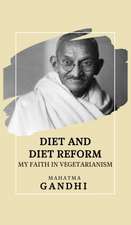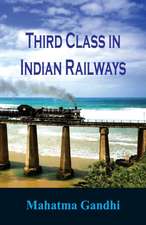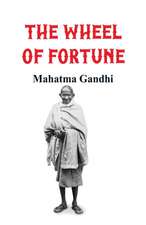Indian Home Rule: Mint Editions
Autor Mahatma Gandhien Limba Engleză Paperback – 16 noi 2021
| Toate formatele și edițiile | Preț | Express |
|---|---|---|
| Paperback (2) | 38.03 lei 22-36 zile | |
| Mint Editions – 16 noi 2021 | 38.03 lei 22-36 zile | |
| Alpha Editions – 30 sep 2017 | 180.30 lei 43-57 zile |
Din seria Mint Editions
-
 Preț: 32.32 lei
Preț: 32.32 lei -
 Preț: 111.03 lei
Preț: 111.03 lei -
 Preț: 81.23 lei
Preț: 81.23 lei -
 Preț: 92.53 lei
Preț: 92.53 lei -
 Preț: 56.26 lei
Preț: 56.26 lei -
 Preț: 43.90 lei
Preț: 43.90 lei -
 Preț: 153.79 lei
Preț: 153.79 lei -
 Preț: 62.64 lei
Preț: 62.64 lei -
 Preț: 27.00 lei
Preț: 27.00 lei -
 Preț: 299.10 lei
Preț: 299.10 lei -
 Preț: 177.54 lei
Preț: 177.54 lei -
 Preț: 74.19 lei
Preț: 74.19 lei -
 Preț: 146.59 lei
Preț: 146.59 lei -
 Preț: 62.45 lei
Preț: 62.45 lei -
 Preț: 210.27 lei
Preț: 210.27 lei -
 Preț: 117.10 lei
Preț: 117.10 lei -
 Preț: 85.73 lei
Preț: 85.73 lei -
 Preț: 50.05 lei
Preț: 50.05 lei -
 Preț: 161.22 lei
Preț: 161.22 lei -
 Preț: 68.66 lei
Preț: 68.66 lei -
 Preț: 99.14 lei
Preț: 99.14 lei -
 Preț: 68.21 lei
Preț: 68.21 lei -
 Preț: 54.64 lei
Preț: 54.64 lei -
 Preț: 41.11 lei
Preț: 41.11 lei -
 Preț: 237.11 lei
Preț: 237.11 lei -
 Preț: 103.89 lei
Preț: 103.89 lei -
 Preț: 49.88 lei
Preț: 49.88 lei -
 Preț: 55.61 lei
Preț: 55.61 lei -
 Preț: 116.88 lei
Preț: 116.88 lei -
 Preț: 32.32 lei
Preț: 32.32 lei -
 Preț: 38.70 lei
Preț: 38.70 lei -
 Preț: 69.30 lei
Preț: 69.30 lei -
 Preț: 49.88 lei
Preț: 49.88 lei -
 Preț: 25.53 lei
Preț: 25.53 lei -
 Preț: 32.76 lei
Preț: 32.76 lei -
 Preț: 66.16 lei
Preț: 66.16 lei -
 Preț: 56.67 lei
Preț: 56.67 lei -
 Preț: 55.20 lei
Preț: 55.20 lei -
 Preț: 43.90 lei
Preț: 43.90 lei -
 Preț: 75.01 lei
Preț: 75.01 lei -
 Preț: 37.88 lei
Preț: 37.88 lei -
 Preț: 43.04 lei
Preț: 43.04 lei -
 Preț: 68.02 lei
Preț: 68.02 lei -
 Preț: 99.77 lei
Preț: 99.77 lei -
 Preț: 75.20 lei
Preț: 75.20 lei -
 Preț: 117.10 lei
Preț: 117.10 lei -
 Preț: 56.26 lei
Preț: 56.26 lei -
 Preț: 56.26 lei
Preț: 56.26 lei -
 Preț: 37.88 lei
Preț: 37.88 lei -
 Preț: 202.36 lei
Preț: 202.36 lei
Preț: 38.03 lei
Nou
Puncte Express: 57
Preț estimativ în valută:
7.28€ • 7.91$ • 6.12£
7.28€ • 7.91$ • 6.12£
Carte disponibilă
Livrare economică 31 martie-14 aprilie
Preluare comenzi: 021 569.72.76
Specificații
ISBN-13: 9781513218250
ISBN-10: 1513218255
Pagini: 90
Dimensiuni: 127 x 203 x 5 mm
Greutate: 0.11 kg
Editura: Mint Editions
Seria Mint Editions
ISBN-10: 1513218255
Pagini: 90
Dimensiuni: 127 x 203 x 5 mm
Greutate: 0.11 kg
Editura: Mint Editions
Seria Mint Editions
Notă biografică
Mahatma Gandhi (1869-1948) was an Indian lawyer, nationalist, and civil rights activist. Born Mohandas Karamchand Gandhi, he was first given the honorary title of MahatmäSanskrit for ¿great-souled¿¿in 1914 while living in South Africa. Raised in Gujarat in a prominent Hindu family, he travelled to London and studied law at the Inner Temple. Called to the Bar in 1891, Gandhi returned to India for a brief time before settling in South Africa. There, he started a family while perfecting his style of nonviolent resistance grounded in civil disobedience. In 1915, he returned to his native country to join the fight against British rule, organizing peasants across India to take a stand against taxation, racism, and other forms of colonial oppression. He became the leader of the Indian National Congress in 1921 and increased his involvement with the movements for women¿s rights, religious and ethnic equality, and the elimination of Indiäs caste system, which unjustly effected Dalits deemed untouchable from birth. His central cause, however, was Swaraj, which can be translated as self-governance or democracy. As his popularity increased, he simplified his lifestyle in solidarity with the Indian poor, wearing traditional clothing, eating vegetarian food, and fasting as a matter of personal hygiene and protest. In 1930, he led the twenty-five day Dandi Salt March or Salt Satyagraha, in response to a British salt tax, inspiring millions of Indians to take direct action against British rule. A proponent of religious pluralism, he lamented the interfaith violence between Hindus, Sikhs, and Muslims that broke out following independence and the partition of India and Pakistan in 1947. At 78 years old, he was assassinated by a Hindu nationalist for his outreach to the Muslim community.









